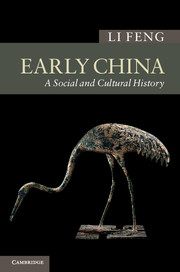Book contents
- Frontmatter
- Contents
- List of Figures
- List of Maps
- Preface
- Chronology of Early China
- Map
- 1 Introduction: Early China and its natural and cultural demarcations
- 2 The development of complex society in China
- 3 Erlitou and Erligang: early state expansion
- 4 Anyang and beyond: Shang and contemporary Bronze Age cultures
- 5 Cracking the secret bones: literacy and society in late Shang
- 6 The inscribed history: the Western Zhou state and its bronze vessels
- 7 The creation of paradigm: Zhou bureaucracy and social institutions
- 8 Hegemons and warriors: social transformation of the Spring and Autumn period (770–481 BC)
- 9 The age of territorial states: Warring States politics and institutions (480–221 BC)
- 10 Philosophers as statesmen: in the light of recently discovered texts
- 11 The Qin unification and Qin Empire: who were the terracotta warriors?
- 12 Expansion and political transition of the Han Empire
- 13 State and society: bureaucracy and social orders under the Han Empire
- 14 Ideological changes and their reflections in Han culture and Han art
- Index
- References
9 - The age of territorial states: Warring States politics and institutions (480–221 BC)
Published online by Cambridge University Press: 05 June 2014
- Frontmatter
- Contents
- List of Figures
- List of Maps
- Preface
- Chronology of Early China
- Map
- 1 Introduction: Early China and its natural and cultural demarcations
- 2 The development of complex society in China
- 3 Erlitou and Erligang: early state expansion
- 4 Anyang and beyond: Shang and contemporary Bronze Age cultures
- 5 Cracking the secret bones: literacy and society in late Shang
- 6 The inscribed history: the Western Zhou state and its bronze vessels
- 7 The creation of paradigm: Zhou bureaucracy and social institutions
- 8 Hegemons and warriors: social transformation of the Spring and Autumn period (770–481 BC)
- 9 The age of territorial states: Warring States politics and institutions (480–221 BC)
- 10 Philosophers as statesmen: in the light of recently discovered texts
- 11 The Qin unification and Qin Empire: who were the terracotta warriors?
- 12 Expansion and political transition of the Han Empire
- 13 State and society: bureaucracy and social orders under the Han Empire
- 14 Ideological changes and their reflections in Han culture and Han art
- Index
- References
Summary
The overall political and military situation in the centuries following the eastward migration of the Zhou royal court can be characterized as big fish eating small fish. If the rulers, particularly those who had achieved the respectable status of “hegemon” in the Spring and Autumn period, still had at least some sympathy towards their brotherly states of common Zhou origin when coming to the matter of conquest, such feelings of affection would seem to have been a sign of misconceived political naivety in the face of the brutal military reality of the Warring States period. By the beginning of the fifth century BC only a little more than twenty of the original some sixty to seventy or so states seen in the record had survived the conflict of the previous three centuries. At the end of the century only about two dozen were still struggling for survival. Such a tendency to ruthless conquest and annexation was further intensified in the fourth century BC, and by the early third century there had emerged a relatively stable multipolar power structure in China dominated by seven powerful territorial states, Wei, Zhao, Hann, Qi, Qin, Chu, and Yan, together with a few much smaller polities sandwiched between them (Map 9.1). The major states rose to dominance one after another through political and social reform, and all had become too large to be easily swallowed by their enemies. As China was irreversibly organized into seven gigantic killing machines, there had also developed a realization that, as expressively stated by philosophers and politicians of the time, such a condition was not desirable, much less ideal, to anyone, and indeed many rulers had entertained the dream of being the sole ruler to conquer all others. This was eventually achieved by the king of Qin in 221 BC, the year of the founding of the Qin Empire. Therefore, the Warring States can also be seen as a period during which the skills and institutions that supported the future empire were gradually developed.
- Type
- Chapter
- Information
- Early ChinaA Social and Cultural History, pp. 182 - 205Publisher: Cambridge University PressPrint publication year: 2013



